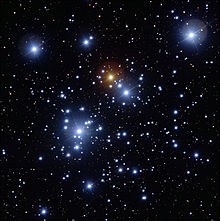 The centre of NGC 4755, with DU Cru at top right Credit: NASA/ESA and Jesús Maíz Apellániz (Instituto de Astrofísica de Andalucía, Spain) | |
| Observation data Epoch J2000 Equinox J2000 | |
|---|---|
| Constellation | Crux |
| Right ascension | 12 53 41.33485 |
| Declination | −60° 20′ 57.9647″ |
| Apparent magnitude (V) | 7.45 |
| Characteristics | |
| Spectral type | M2- Iab |
| U−B color index | +2.57 |
| B−V color index | +2.22 |
| Variable type | Lc |
| Astrometry | |
| Radial velocity (Rv) | −21.24 km/s |
| Proper motion (μ) | RA: −4.703 mas/yr Dec.: −1.162 mas/yr |
| Parallax (π) | 0.5075 ± 0.0516 mas |
| Distance | 2,600 pc |
| Absolute magnitude (MV) | −5.52 |
| Details | |
| Radius | 664 R☉ |
| Luminosity | 69,600 L☉ |
| Temperature | 3,467 K |
| Other designations | |
| DU Cru, CD−59°4459, HIP 62918, SAO 252073, 2MASS J12534132-6020578, IRAS 12506-6004 | |
| Database references | |
| SIMBAD | data |
DU Crucis is a red supergiant and slow irregular variable star in the open cluster NGC 4755, which is also known as the Kappa (κ) Crucis Cluster or Jewel Box Cluster.
Location

DU Crucis is one of the brighter members of the Jewel Box Cluster and the brightest red supergiant, strongly contrasting with the other bright members which are blue supergiants. It is part of the central bar of the prominent letter A-shaped asterism at the centre of the cluster. The cluster is part of the larger Centaurus OB1 association and lies about 8,500 light years away.
The cluster is just to the south-east of β Crucis, the lefthand star of the Southern Cross.
Properties
DU Crucis is an M2 intermediate luminosity supergiant (luminosity class Iab). Despite its low temperature, it is 46,600 times the luminosity of the sun, due to its very large size. The κ Crucis cluster has a calculated age of 11.2 million years.
Variability

Photometry from the Hipparcos satellite mission showed that DU Crucis varies in brightness with an amplitude of 0.44 magnitudes. No periodicity could be detected in the variations and it was classified as a slow irregular variable of type Lc, indicating a supergiant.
Notes
References
- ^ van Leeuwen, F. (November 2007), "Validation of the new Hipparcos reduction", Astronomy and Astrophysics, 474 (2): 653–664, arXiv:0708.1752, Bibcode:2007A&A...474..653V, doi:10.1051/0004-6361:20078357, S2CID 18759600.
- ^ Dachs, J.; Kaiser, D. (November 1984), "UBV photometry of the southern galactic cluster NGC 4755 = Kappa Crucis", Astronomy and Astrophysics Supplement Series, 58: 411–429, Bibcode:1984A&AS...58..411D.
- Keenan, Philip C.; McNeil, Raymond C. (1989). "The Perkins catalog of revised MK types for the cooler stars". Astrophysical Journal Supplement Series. 71: 245. Bibcode:1989ApJS...71..245K. doi:10.1086/191373. ISSN 0067-0049. S2CID 123149047.
- ^ Samus, N. N.; Durlevich, O. V.; et al. (2009). "VizieR Online Data Catalog: General Catalogue of Variable Stars (Samus+ 2007-2013)". VizieR On-line Data Catalog: B/GCVS. Originally Published in: 2009yCat....102025S. 1. Bibcode:2009yCat....102025S.
- Mermilliod, J. C.; Mayor, M.; Udry, S. (2008). "Red giants in open clusters. XIV. Mean radial velocities for 1309 stars and 166 open clusters". Astronomy and Astrophysics. 485 (1): 303–314. Bibcode:2008A&A...485..303M. CiteSeerX 10.1.1.30.7545. doi:10.1051/0004-6361:200809664.
- ^ Brown, A. G. A.; et al. (Gaia collaboration) (August 2018). "Gaia Data Release 2: Summary of the contents and survey properties". Astronomy & Astrophysics. 616. A1. arXiv:1804.09365. Bibcode:2018A&A...616A...1G. doi:10.1051/0004-6361/201833051. Gaia DR2 record for this source at VizieR.
- ^ Aidelman, Y.; Cidale, L. S.; Zorec, J.; Arias, M. L. (2012). "Open clusters. I. Fundamental parameters of B stars in NGC 3766 and NGC 4755". Astronomy & Astrophysics. 544: A64. Bibcode:2012A&A...544A..64A. doi:10.1051/0004-6361/201219069. hdl:11336/145136.
- Corti, M. A.; Orellana, R. B. (2013). "Members of Centaurus OB1 and NGC 4755: New spectroscopic and astrometric studies". Astronomy & Astrophysics. 553: A108. Bibcode:2013A&A...553A.108C. doi:10.1051/0004-6361/201220743. hdl:11336/8495.
- ^ Harris, G. L. H. (1976). "Evolved stars in open clusters". Astrophysical Journal. 30: 451. Bibcode:1976ApJS...30..451H. doi:10.1086/190368.
- Healy, Sarah; Horiuchi, Shunsaku; Molla, Marta Colomer; Milisavljevic, Dan; Tseng, Jeff; Bergin, Faith; Weil, Kathryn; Tanaka, Masaomi (2024-03-23). "Red Supergiant Candidates for Multimessenger Monitoring of the Next Galactic Supernova". Monthly Notices of the Royal Astronomical Society. 529 (4): 3630–3650. arXiv:2307.08785. Bibcode:2024MNRAS.529.3630H. doi:10.1093/mnras/stae738. ISSN 0035-8711.
- Kharchenko, N. V.; Piskunov, A. E.; Röser, S.; Schilbach, E.; Scholz, R.-D. (2004). "Astrophysical supplements to the ASCC-2.5. II. Membership probabilities in 520 Galactic open cluster sky areas". Astronomische Nachrichten. 325 (9): 740–748. Bibcode:2004AN....325..740K. doi:10.1002/asna.200410256.
- "Hipparcos Tools Interactive Data Access". Hipparcos. ESA. Retrieved 8 December 2021.
- Adelman, Saul J. (2001). "Stars with the Largest Hipparcos Photometric Amplitudes". Baltic Astronomy. 10 (4): 589. Bibcode:2001BaltA..10..589A. doi:10.1515/astro-2001-0403.
External links
| Constellation of Crux | |||||||||||
|---|---|---|---|---|---|---|---|---|---|---|---|
| Stars |
| ||||||||||
| |||||||||||
| |||||||||||
| |||||||||||